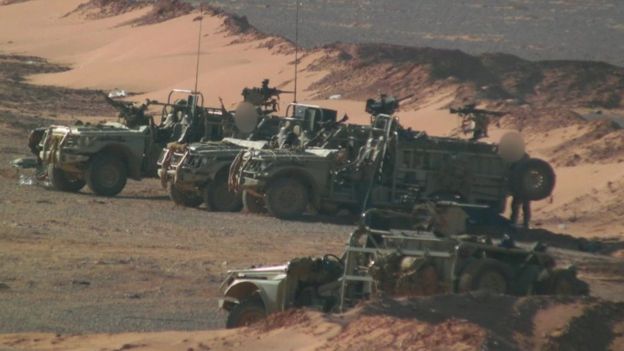BBC
The BBC has obtained exclusive pictures showing for the first time British special forces operating on the ground in Syria.
It is the vehicles that first stand out. The open air, Thalab long range patrol vehicles are built for harsh terrain and are favoured by special forces.
In this case it is British special forces, seen for the first time on the ground, inside Syria, in photographs obtained by the BBC.
The pictures, which date from June, follow an attack by the so-called Islamic State (IS) on the moderate rebel New Syrian Army base of Al Tanaf on the Syria-Iraq border. The British soldiers appear to be securing the base's perimeter.
According to eyewitnesses, they were there in a defensive role. But they are carrying an arsenal of equipment including sniper rifles, heavy machine guns and anti-tank missiles.
If IS attacked again they would have been able to put up a considerable fight.
A New Syrian Army's spokesman refused to comment on the pictures of the special forces, but acknowledged their help.
He said: "We are receiving special forces training from our British and American partners. We're also getting weapons and equipment from the Pentagon as well as complete air support."
Disruption failed
The Pentagon's programme to train and equip moderate rebels is generally seen as a failure, after many of its fighters were kidnapped or gave their weapons to al-Qaeda in Syria.
The New Syrian Army, which draws most of its recruits from Deir Ezzor province, failed in a recent attempt to disrupt a key IS trading route across the Iraq-Syria border, but they have been able to fend off attacks at Al Tanaf.
They were mocked in an IS propaganda video following the failure of the Al-Bukamal attack. IS seized equipment and killed four of its fighters. One captured New Syrian Army recruit was shown being beheaded.
And, embarrassingly for its Western partners, videos of training sessions with western special forces were also included in the IS broadcast.
Another Western-backed rebel group, Asala and Tanmiya Front, broke with the New Syrian Army after the operation. Its spokesman, Abdelsalam al-Miz'il, has been critical of its planning.
He said: "We had met several parties and officially informed them, even before the al-Bukamal battle, that things weren't ready and inserting several fighters will not lead to liberation.
"We must first prepare things on the inside (the territory) and whip up popular support."
But the New Syrian Army's spokesman denied the operation was a complete failure. He said: "It was satisfactorily concluded by sticking a knife into the one of the most secure strongholds of the Islamic State."
And he added: "We need the international community to take a serious stand with all Syrians, with the Syrian rebels and the Syrian revolution in order to decapitate the head of terror, whether it may be Assad's or IS's or any terrorist organisation in Syria."
After viewing the pictures of British fighters at the base, the Ministry of Defence said it wouldn't comment on special forces operations.
Their numbers may be small, but on the frontlines in the fight against the Islamic State, time will tell if they are making a difference."

